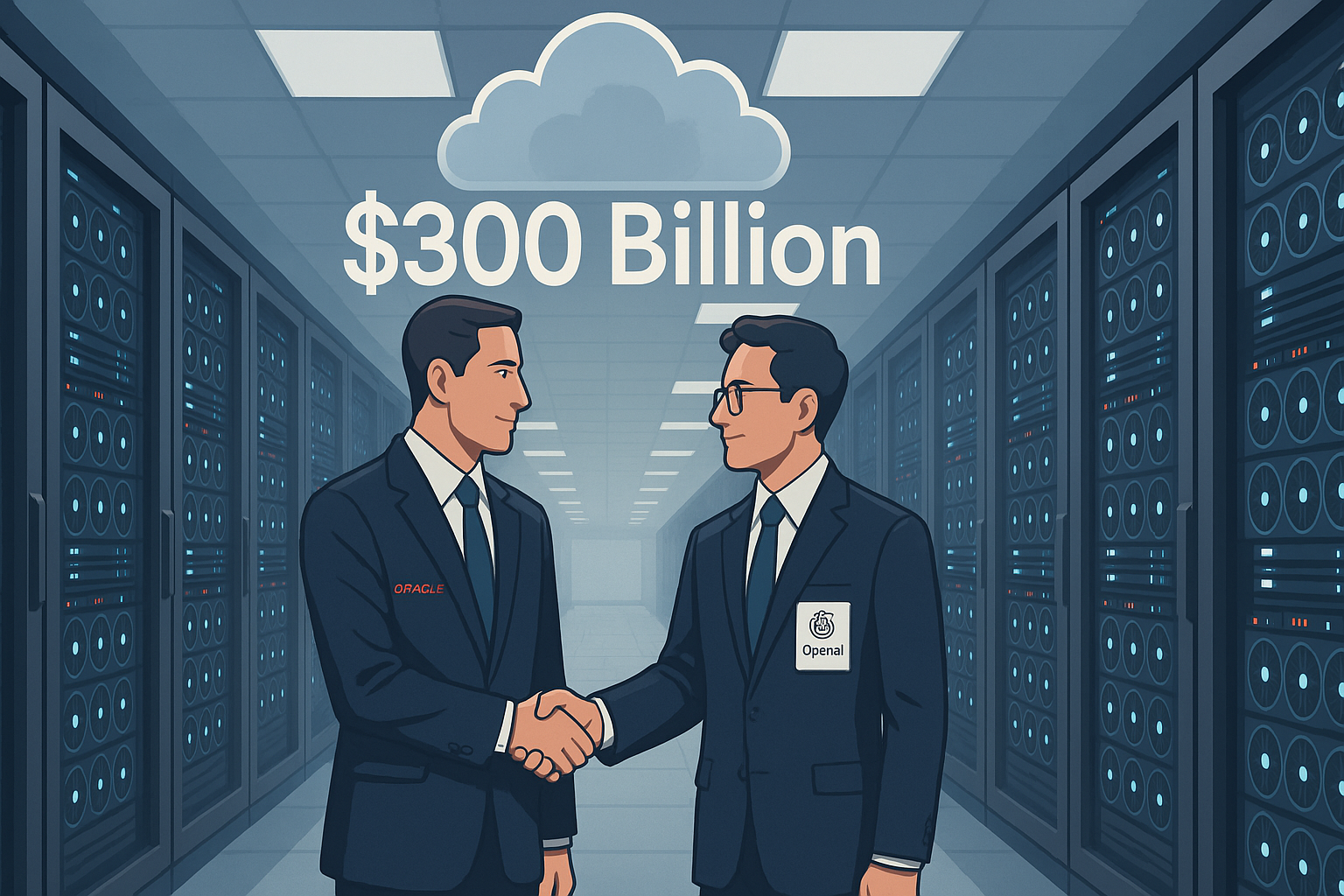In what might be the tech deal of the decade—or possibly the century—Oracle and OpenAI have announced a cloud computing partnership valued at a mind-boggling $300 billion over ten years. The agreement, which dropped like a bomb on Wall Street yesterday, represents more than just astronomical numbers; it signals a fundamental power shift in the AI infrastructure game.
I've covered tech partnerships for nearly fifteen years, and let me tell you: this one feels different.
Most mega-deals follow a predictable pattern—splashy announcement, temporary stock surge, executives making rounds on CNBC, followed by the quiet disappointment of unmet "synergies" a few quarters later. But the Oracle-OpenAI alliance breaks the mold in ways that have even the most jaded industry analysts raising their eyebrows.
"It's an absolutely transformative arrangement," said one investment banker who requested anonymity because they weren't authorized to speak publicly. "We're talking about annual commitments larger than some cloud providers' entire revenue streams."
The GPU Gold Rush
Here's the thing about modern AI development: it's insatiably hungry for computing power. More specifically, it devours GPUs—those specialized chips that have transformed from gaming accessories into the backbone of artificial intelligence.
Oracle, long dismissed by Silicon Valley's cool kids as yesterday's tech giant, has apparently been quietly amassing what might be the world's most impressive collection of these computational jewels. While everyone was busy watching AWS, Microsoft, and Google duke it out, Larry Ellison's crew was... well, building.
"Oracle?" a prominent venture capitalist texted me after the announcement. "Seriously? Oracle?"
Yes, seriously. The database company that most developers love to complain about has somehow positioned itself as the infrastructure backbone for possibly the most consequential AI company on the planet. It's like discovering your accountant uncle who still uses Yahoo Mail has secretly been a crypto billionaire since 2013.
The Numbers Game
Let's talk about that $300 billion figure for a moment. It's so large it almost loses meaning—approximately the GDP of Finland or Ireland, give or take.
Oracle's stock jumped 8% on the news, which honestly seems restrained considering they've essentially locked in decade-long revenue equivalent to about three-quarters of their current market cap. The muted reaction suggests Wall Street isn't entirely convinced these numbers will materialize as advertised. (Having covered tech since the dot-com bubble, I've learned that announced numbers and actual dollars have a relationship best described as "loosely inspired by true events.")
There's also the practical question: can OpenAI actually consume $30 billion of cloud services annually? That's more than Netflix, Uber, and Airbnb spend on cloud services combined. Either Sam Altman knows something extraordinary about AI's future scale, or someone got a bit carried away with their projection models.
Microsoft's Awkward Position
You've gotta wonder what they're thinking in Redmond right now.
Microsoft has invested billions in OpenAI—becoming not just its primary backer but practically building its business strategy around the partnership. Watching your AI protégé sign a massive deal with Oracle must feel... complicated.
"It's like paying for your kid's entire education only to have them move in with your eccentric neighbor," one former Microsoft executive told me over coffee this morning. "You're happy they're successful, but did it have to be with them?"
The relationship dynamics here are fascinating. Microsoft needs OpenAI's technology. OpenAI needs Microsoft's money and distribution. And now, apparently, OpenAI needs Oracle's infrastructure. It's a technological love triangle with hundreds of billions at stake.
Reshuffling the Cloud Deck
For years, the cloud computing hierarchy has been relatively stable—AWS leading, Microsoft Azure gaining, Google Cloud a distant third, and everyone else fighting for scraps.
This deal could change everything.
Cloud computing has always been a scale game. The fixed costs are enormous (those data centers don't come cheap), and profitability depends on spreading those costs across as many workloads as possible. Oracle just secured what amounts to the ultimate cloud tenant, potentially giving them the scale economics that have eluded them for years.
If—and this remains a significant if—AI workloads become the dominant form of cloud computing, the competitive landscape could shift dramatically in favor of whoever can best serve those specific needs.
One cloud engineering director I spoke with yesterday (who works for neither Oracle nor OpenAI) put it bluntly: "The cloud war just entered a new phase, and someone changed the rules without telling AWS."
The Regulatory Question Mark
With amounts this large involved between critical infrastructure and a leading AI provider, regulatory scrutiny is inevitable. Antitrust concerns have already been swirling around the AI industry, and this deal will only intensify that spotlight.
The timing is particularly interesting given the increased scrutiny AI companies face about their economics. It's almost as if both companies needed an announcement big enough to drown out whispers that maybe—just maybe—current AI approaches aren't as financially sustainable as everyone hopes.
Look, I don't know if this partnership will ultimately deliver on its $300 billion promise. Tech history is littered with partnerships that sounded revolutionary at announcement and fizzled in execution.
But one thing's certain: in the high-stakes game of AI infrastructure, Oracle just pushed all its chips to the center of the table. And for a company many had written off as tech's past rather than its future, that's a plot twist few saw coming.
The cloud computing world will never be the same. Whether that's good news for Oracle, OpenAI, or neither remains to be seen.
